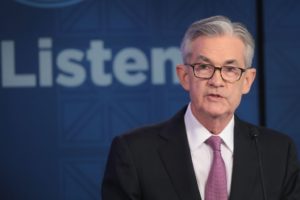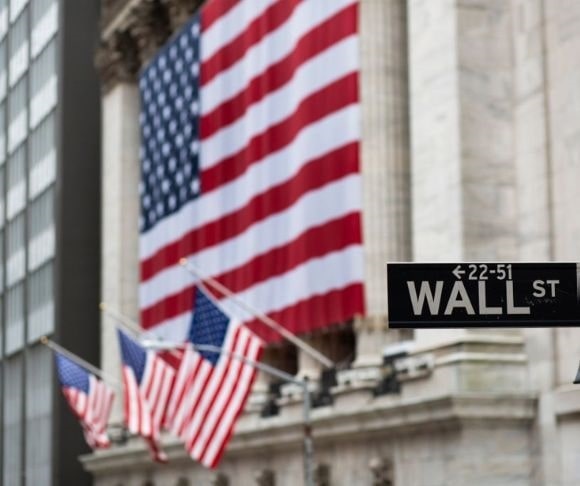Wall Street investors have stopped doing the Powell Putsch as the Federal Reserve turns down the music of the printing press. Following its two-day Federal Open Market Committee (FOMC) policy meeting, the US central bank raised interest rates by 50 basis points, the most since the year 2000, and announced a plan to trim its $9 trillion balance sheet. Market analysts believed the Eccles Building would adopt a ruthless aggression attitude. But Chair Jerome Powell reassured traders that rate hikes would not surpass half a point at any future meeting on the path toward neutrality, triggering a bout of euphoria that quickly turned sour. The Powell Putsch has been shifted into reverse, but is it too late?
Take a Hike!
 Before going into the nitty-gritty of quantitative tightening, what does this mean for the average person who does not gape at the television screen or computer monitor, watching CNBC or Bloomberg?
Before going into the nitty-gritty of quantitative tightening, what does this mean for the average person who does not gape at the television screen or computer monitor, watching CNBC or Bloomberg?
As interest rates go up, borrowing costs for consumers increase, affecting everything from credit cards to mortgages (indirectly) to auto loans. For taxpayers, this is also worrisome because high rates will force the federal government to pay more to service its astronomical debt levels. Suffice it to say, debt will become more expensive over the next decade, requiring households and Uncle Sam to make some tough decisions. Traders will take massive blows to their trading accounts since the era of cheap money is coming to a close, prompting them to engage in good old-fashioned balance sheet investing.
For a nation swimming in debt, millions of people are going to drown. But will the Fed stick out its hand and save everyone? The interest-rate futures market thinks the Fed will cut rates by the end of 2023.
Prepare for Landing

Jerome Powell (Photo by Scott Olson/Getty Images)
The talk on the New York Stock Exchange is about whether the Fed’s tightening campaign will lead the US economy to a soft landing or a hard crash. Powell is confident that he can pilot the country to a “soft or soft-ish” landing, while others aver it would be a magical feat if the head of the world’s most powerful institution successfully pinned inflation to the ground and ensured the economy expanded more than 1.5% every quarter. Harry Houdini would blush at such a trick.
In this current environment, the consumer price index (CPI) is north of 8%, the first-quarter gross domestic product (GDP) growth rate was -1.4%, inflationary forces are imbibing wage growth, and consumer sentiment is subdued. The only strong component of this post-pandemic economy is the labor market, with more than 400,000 jobs created in April. By the summer, the nation is poised to recover all jobs lost due to COVID-19, proving that opening an economy does wonders for employment.
With such abnormal conditions and trends, the odds of stagflation or a recession are growing. This is what Powell and his merry band of central bankers are trying to avert. Can a downturn be avoided after getting everyone hooked on ultra-accommodative monetary policy in the wake of the pandemic?
Clearly, the Fed is frightened of being aggressive, despite talking big at the March FOMC meeting. If it were serious about grappling with 40-year high inflation, the central bank would have heeded St. Louis Fed Bank President James Bullard’s recommendation by employing the tools to lift the benchmark fed funds rate to 3.5% by July. However, Minneapolis Fed Bank President Neel Kashkari insists that the organization is not behind the curve, contrary to what critics aver. Instead, this slow-and-steady approach is helping lower inflation, he says. But there is a paucity of data confirming this laughable assertion.
Learning From Mistakes

Kristalina Georgieva (Photo by Samuel Corum/Getty Images)
Kristalina Georgieva, the director of the International Monetary Fund (IMF), recently conceded that central banks everywhere “printed too much money and didn’t think of unintended consequences.” But while she acknowledged that this has contributed to the current crisis, Georgieva refused to learn from these mistakes. In fact, she doubled down and pledged more of the same during the next calamity.
This flippant attitude is what will eventually lead to events worse than the dot-com crash, the Great Recession, and the COVID hysteria. It is going to be Powellflation or, if you will, Brainardflation in the future. Indeed, it might be easy to quarterback two years after the coronavirus pandemic, but most of today’s problems would have never happened if the Fed turned off the printing press once the leading benchmark indexes, from the Dow Jones to the Nasdaq, recuperated and maintained their upward trajectory. Be it the meme craze or irrational exuberance, the corner suite hedge fund junkies, the Robinhood men in tights, and the cool kids from Wall Street Bets might not have transformed Wall Street into Arkham Asylum.




